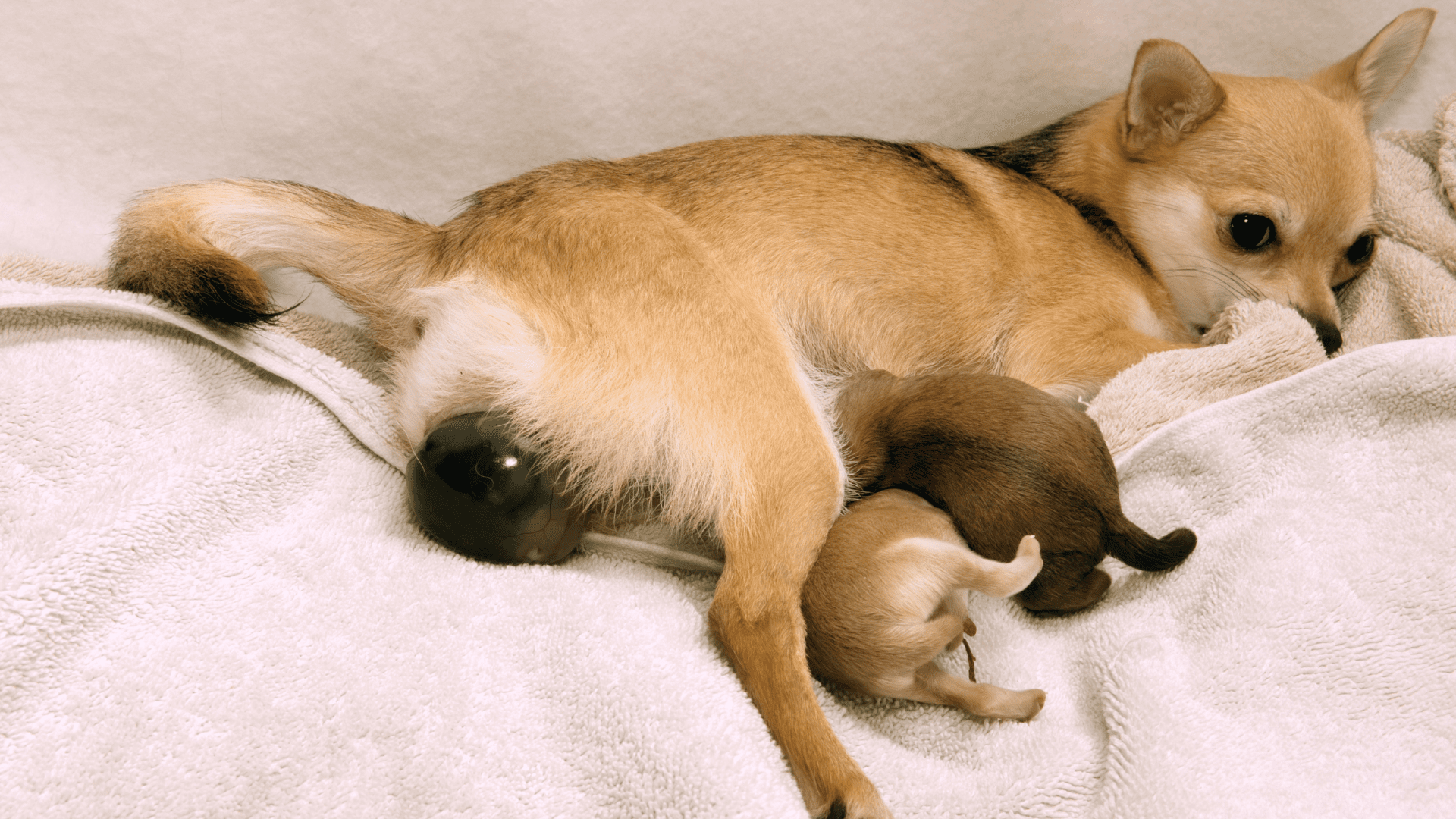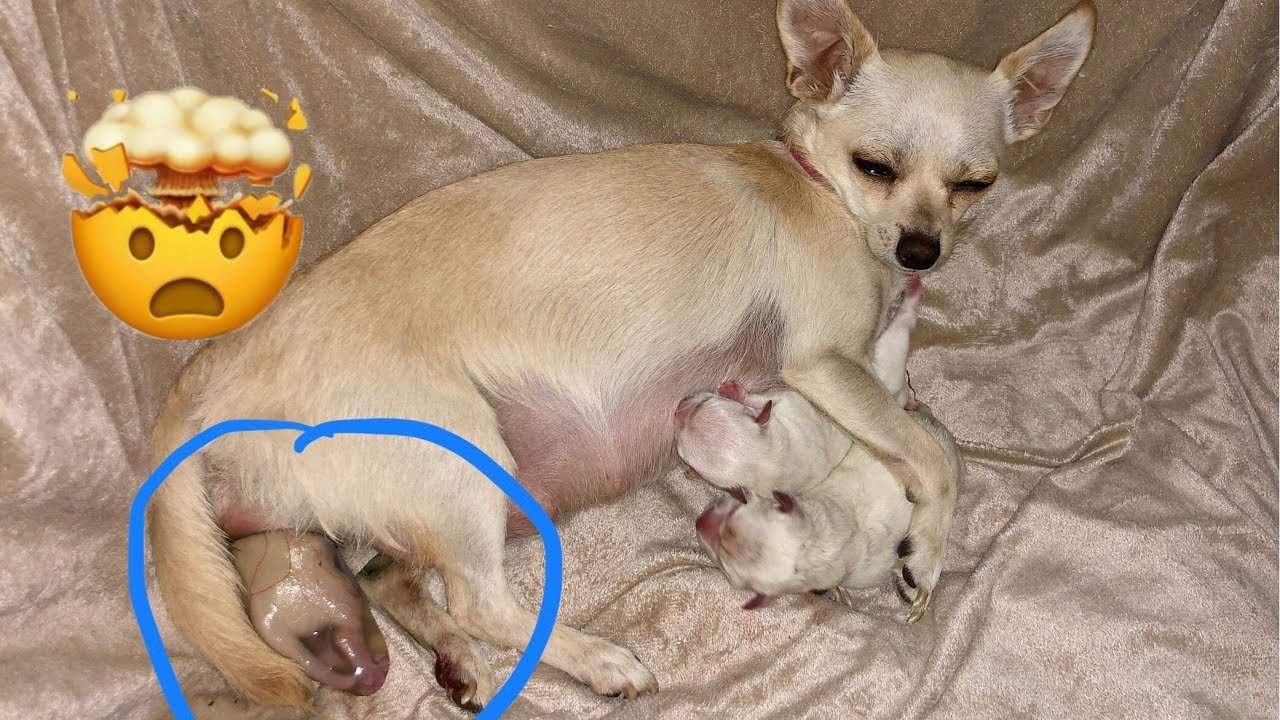Can a chihuahua give birth naturally? It may surprise you, but despite their small size, chihuahuas are able to give birth naturally just like any other dog breed. Although they are known for being tiny and delicate, chihuahuas have the ability to carry and deliver their puppies without any assistance. Their small stature does not prevent them from experiencing the natural process of childbirth.
When it comes to chihuahuas giving birth naturally, their history and background play a significant role. Chihuahuas are believed to have originated in Mexico and were bred as companion dogs. Over time, they have retained their natural instincts, allowing them to successfully deliver their puppies without any complications. It is important to provide a comfortable and safe environment for the mother chihuahua during the birthing process, ensuring that she has access to clean bedding and enough space. By understanding their breed history and providing the necessary care, chihuahuas can give birth naturally just like any other dog.
Chihuahuas can typically give birth naturally, but it’s important to provide the right environment and support. Create a warm and quiet space for the birth, and ensure the mother feels comfortable and safe. Keep an eye on her progress and be ready to assist if necessary, but remember that interference can often do more harm than good. If you have any concerns, consult with a veterinarian for guidance. Remember, each chihuahua’s birthing experience may vary.

Can a Chihuahua Give Birth Naturally?
Chihuahuas are adorable and popular small breed dogs known for their lively and spirited personalities. Due to their petite size, there are often concerns about their ability to give birth naturally. Many people wonder if Chihuahuas require caesarean sections or if they can safely deliver their puppies without intervention. In this article, we will explore the topic of whether a Chihuahua can give birth naturally, debunking any misconceptions and providing you with the information you need to know.
1. Understanding the Chihuahua’s Natural Birthing Ability
Chihuahuas are capable of giving birth naturally, just like any other dog breed. While it is true that some Chihuahuas may experience difficulty during labor due to their small size and narrow pelvis, most Chihuahuas are perfectly capable of delivering their puppies without any complications. It is important to note that the ability to give birth naturally can vary from one Chihuahua to another.
Factors such as the size and shape of the Chihuahua, the size of the puppies, and the positioning of the puppies in the birth canal can all influence the ease of natural delivery. It is recommended to consult with a veterinarian experienced in Chihuahua breeding to assess the individual dog’s situation and determine the best course of action.
1.1 Factors Affecting Natural Delivery
When considering a Chihuahua’s ability to give birth naturally, several factors come into play. The size of the Chihuahua is one of the primary determinants. A smaller-sized Chihuahua might have a more challenging time delivering larger puppies through her narrow birth canal. Additionally, the shape of the Chihuahua’s pelvis can affect the ease of natural birthing. Some Chihuahuas may have a more constricted pelvis, which can make it difficult for the puppies to pass through.
The size, position, and number of the puppies also play a crucial role. If a Chihuahua is carrying a large number of puppies or if the puppies are unusually large, it may increase the risk of complications during delivery. Similarly, puppies positioned in abnormal ways, such as breech presentation, can make natural birth more complicated. In such cases, intervention may be necessary to ensure the safety of both the mother and her puppies.
2. Signs of Labor and Preparing for Natural Birth
As an owner, it is important to be aware of the signs of labor in your Chihuahua and prepare for the birthing process. Some common signs that your Chihuahua is ready to give birth include restlessness, nesting behavior, a drop in body temperature, loss of appetite, and the onset of contractions.
Before the anticipated due date, create a warm and comfortable whelping area for your Chihuahua. This should include a designated box with clean bedding, providing a cozy and safe environment for the mother and her puppies. Make sure to have an emergency birthing kit ready, which should include clean towels, sterile gloves, dental floss or thread for tying off umbilical cords, and a heating pad to maintain a warm temperature.
2.1 The Role of the Owner
During the birthing process, it is essential for the owner to remain calm and prepared. Provide support and reassurance to your Chihuahua to help her feel secure and relaxed. Keep a close eye on the progress of labor and any complications that may arise. If you notice excessive straining without any puppies being delivered or if your Chihuahua appears distressed, contact a veterinarian immediately.
Remember to avoid unnecessary intervention during the birthing process unless there is a genuine medical concern. Chihuahuas are instinctively capable of giving birth on their own, and interfering without a valid reason can potentially cause more harm than good.
3. When Medical Intervention Is Required
While most Chihuahuas can give birth naturally without any issues, certain situations may necessitate medical intervention. Your veterinarian will be able to assess the situation and determine the best course of action. Some circumstances where intervention may be required include:
- Obstructed labor: If the puppies are too large or positioned in a way that obstructs delivery, a caesarean section may be necessary.
- Distressed mother or puppies: If the Chihuahua or her puppies show signs of distress or complications during labor, prompt intervention is crucial to ensure their well-being.
- Prolonged labor: If labor is not progressing after several hours, it might indicate a problem that requires veterinary assistance.
3.1 The Role of the Veterinarian
It is essential to work closely with a veterinarian experienced in Chihuahua breeding throughout the pregnancy and birthing process. Regular check-ups and ultrasounds can help monitor the health of the mother and her puppies, ensuring any potential issues are addressed promptly. Consultation with a professional can provide peace of mind and help navigate any complications that may arise during the birthing process.
Tips for Supporting Your Chihuahua During Birth
When supporting your Chihuahua during the birthing process, keep the following tips in mind:
- Provide a quiet and secluded whelping area to minimize stress and promote relaxation.
- Ensure a warm and comfortable environment for the mother and her puppies.
- Monitor the progress of labor and seek veterinary assistance if necessary.
- Refrain from unnecessary intervention unless there are signs of distress or complications.
- Be prepared with an emergency birthing kit, including essential supplies.
- Offer support and reassurance to your Chihuahua throughout the process.
Conclusion
In conclusion, Chihuahuas can give birth naturally, although individual circumstances may vary. Factors such as size, shape, and position of the Chihuahua, as well as the size and position of the puppies, can influence the ease of natural delivery. It is crucial to monitor the progress of labor and seek veterinary assistance when necessary. By providing the necessary support and ensuring a safe and comfortable environment, you can help your Chihuahua through the birthing process and welcome her adorable puppies into the world.
Key Takeaways: Can a Chihuahua Give Birth Naturally?
1. Chihuahuas are able to give birth naturally, just like any other dog breed.
2. It is important to provide proper prenatal care and nutrition to ensure a healthy pregnancy and delivery.
3. Chihuahuas are known for their small size, so their puppies may be delicate and require extra attention during the birthing process.
4. It is advisable to have a veterinarian on standby in case of any complications during labor.
5. Chihuahuas are generally capable of giving birth naturally, but every dog is unique, so it is important to monitor the mother closely and seek professional advice if needed.
Frequently Asked Questions
Are you curious about whether chihuahuas can give birth naturally? Here are some common questions and their answers to help you understand the birthing process for chihuahuas.
1. What are the chances of a chihuahua giving birth naturally?
The chances of a chihuahua giving birth naturally are generally good, as long as there are no underlying health issues or complications. Chihuahuas are small dogs, and their pelvic openings are typically large enough to allow for natural childbirth. However, it’s always important to monitor the pregnancy closely and consult with a veterinarian to ensure everything is progressing well.
During labor, chihuahuas may experience contractions and go through stages of restlessness, panting, and nesting. It’s essential to create a comfortable and quiet environment for them to give birth in. If any difficulties arise during labor, it’s crucial to seek veterinary assistance to ensure the safety and well-being of both the mother and her puppies.
2. What are some signs that a chihuahua is going into labor?
There are several signs that indicate a chihuahua is going into labor. Some common signs include restlessness, panting, nesting behavior, and a decrease in appetite. You may also notice a clear, slightly pinkish discharge from the chihuahua’s vulva, which is a sign that labor is imminent.
As the contractions start, the chihuahua may become more vocal and show signs of discomfort. It’s important to observe the chihuahua closely and provide support and a calm environment during this time. If you notice any signs of distress or if labor does not progress within a reasonable timeframe, contact your veterinarian for guidance.
3. Can a chihuahua give birth without human assistance?
In most cases, a chihuahua can give birth without the need for human assistance. Chihuahuas are instinctive when it comes to the birthing process, and their maternal instincts typically kick in. However, it’s essential for you to be present and monitor the delivery to ensure everything goes smoothly.
During the birthing process, keep an eye on the chihuahua and be ready to assist if needed. You may need to help remove a puppy from its amniotic sac or gently pull on the umbilical cord if it’s not detaching naturally. If you have any concerns or if the chihuahua is having difficulties, contact your veterinarian for guidance and support.
4. How long does it take for a chihuahua to give birth?
The duration of labor can vary from chihuahua to chihuahua. On average, the birthing process for chihuahuas can take anywhere from a few hours to up to 24 hours. Each stage of labor, such as dilation, contractions, and the delivery of each puppy, can take varying amounts of time.
It’s important to understand that every chihuahua is unique, and the length of labor can be influenced by various factors, including the size of the litter and the mother’s overall health. If you have any concerns about the duration of labor, reach out to your veterinarian for advice.
5. What should I do if a chihuahua experiences complications during labor?
If a chihuahua experiences complications during labor, such as prolonged or intense contractions without delivering a puppy, difficulty in giving birth, or excessive bleeding, it’s critical to seek immediate veterinary assistance. Complications can arise due to various reasons, including the size of the puppies, a malpositioned fetus, or a weak or exhausted mother.
Never attempt to resolve complications on your own, as it can be dangerous and potentially harm the mother or the puppies. Contact your veterinarian as soon as possible, explaining the situation, and follow their guidance. It’s important to prioritize the health and well-being of both the mother and her puppies.

In conclusion, when writing a wrap-up, it is essential to consider the tone, language, and structure of our sentences to cater to the specific audience. By following these guidelines, we can provide a clear and concise summary that leaves the reader with a solid understanding of the key points discussed in the article.
